| Srl | Item |
| 1 |
ID:
107981
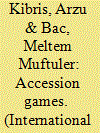

|
|
|
|
|
| Publication |
2011.
|
| Summary/Abstract |
We analyze the EU enlargement process from a rational institutionalist perspective and argue that the accession negotiations are designed to resolve the uncertainty that the existing EU members have in terms of the candidate's preferences. We model the negotiations as a Bayesian game and demonstrate how exactly the design in place helps the European Union in gathering information about the candidate country. Our model also enables us to compare alternative negotiation designs in terms of their ability to alleviate informational problems. We compare the resulting equilibrium payoffs under different negotiation designs to see whether there is any ground for a player to prefer a particular design over others. Our analysis supports the earlier arguments in the literature about the informative role of accession negotiations and demonstrates how exactly the negotiations carry out this role.
|
|
|
|
|
|
|
|
|
|
|
|
|
|
|
|
| 2 |
ID:
139408
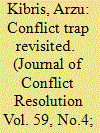

|
|
|
|
|
| Summary/Abstract |
This article analyzes the association between civil conflicts and educational achievement by studying the Turkish case. It combines the 2005 university entrance exam scores of more than 1.6 million students and a newly constructed data set on the casualties of the Turkish–Kurdish conflict to study the association between the conflict and educational achievement of Turkish students. The results reveal a significant negative association. Combined with the already well-established positive links between education and various measures of socioeconomic development like economic growth, social equality, and public health, the results in this article demonstrate that education is one of the channels through which civil conflicts damage the well-being of societies thereby creating the conditions that perpetuate them.
|
|
|
|
|
|
|
|
|
|
|
|
|
|
|
|
| 3 |
ID:
104042
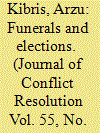

|
|
|
|
|
| Publication |
2011.
|
| Summary/Abstract |
This article empirically analyzes the effects of terrorism on the electoral choices of the Turkish voters in the 1991 and 1995 general elections. It relies on a unique data set that includes the date and the place of burial of Turkish soldiers and police officers who died in the fight against the terrorist organization PKK. The author uses the number of these security force terror casualties at the district level as a measure of the level of terrorism that the people of that district have been exposed to and analyzes whether and how exposure to terrorism affects people's electoral choices. The results indicate that Turkish voters are highly sensitive to terrorism and that they blame the government for their losses. Moreover, exposure to terrorism leads to an increase in the vote share of the right-wing parties who are less concessionist toward the terrorist organization's cause compared to their left-wing counterparts.
|
|
|
|
|
|
|
|
|
|
|
|
|
|
|
|
| 4 |
ID:
132200
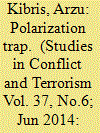

|
|
|
|
|
| Publication |
2014.
|
| Summary/Abstract |
This article studies the association between ethnic conflicts and political attitudes. It employs a new data set on the casualties of the ethnic conflict in Turkey to identify the effects of the Kurdish insurgency on the electoral behavior of the Turkish voters. The results indicate that the conflict leads to the political polarization of the society along ethnic nationalist lines. Further investigation of the data also provides some empirical support for the constructivist argument that the salience of ethnic identities is subject to change in response to external stimuli, of which ethnic conflict constitutes a drastic example.
|
|
|
|
|
|
|
|
|
|
|
|
|
|
|
|
| 5 |
ID:
172174
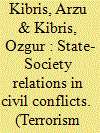

|
|
|
|
|
| Summary/Abstract |
Civil conflicts are conceptualized as asymmetric, population-centric military struggles. The argument is that insurgencies, even though they are no match in military power to their state adversaries in many cases, resort to armed struggle nonetheless as a tool to impair state capacity, the quality of governance, and the ability of the state to honor the “social contract” in order to eventually destroy state authority and render the state irrelevant for the society. Note that this argument implies that state-society relations do react to the military course of the conflict. In this article, we provide empirical evidence for this implication. Introducing a new panel dataset on the long-running civil conflict in Turkey, we first conduct a micro-level analysis and demonstrate the significant impact rebel presence has upon state-society relations across localities and time. We then analyze the results of semi-structured interviews we had conducted with a group of experts from the conflict regions to decipher the possible mechanisms behind the association we observe in the data. The interviews support our motivating theoretical argument.
|
|
|
|
|
|
|
|
|
|
|
|
|
|
|
|